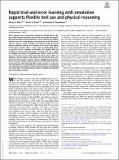Rapid trial-and-error learning with simulation supports flexible tool use and physical reasoning
Author(s)
Allen, Kelsey R; Smith, Kevin A; Tenenbaum, Joshua B
DownloadPublished version (2.152Mb)
Publisher Policy
Publisher Policy
Article is made available in accordance with the publisher's policy and may be subject to US copyright law. Please refer to the publisher's site for terms of use.
Terms of use
Metadata
Show full item recordAbstract
© 2020 National Academy of Sciences. All rights reserved. Many animals, and an increasing number of artificial agents, display sophisticated capabilities to perceive and manipulate objects. But human beings remain distinctive in their capacity for flexible, creative tool use-using objects in new ways to act on the world, achieve a goal, or solve a problem. To study this type of general physical problem solving, we introduce the Virtual Tools game. In this game, people solve a large range of challenging physical puzzles in just a handful of attempts. We propose that the flexibility of human physical problem solving rests on an ability to imagine the effects of hypothesized actions, while the efficiency of human search arises from rich action priors which are updated via observations of the world. We instantiate these components in the "sample, simulate, update" (SSUP) model and show that it captures human performance across 30 levels of the Virtual Tools game. More broadly, this model provides a mechanism for explaining how people condense general physical knowledge into actionable, task-specific plans to achieve flexible and efficient physical problem solving.
Date issued
2020Department
Massachusetts Institute of Technology. Department of Brain and Cognitive Sciences; Center for Brains, Minds, and MachinesJournal
Proceedings of the National Academy of Sciences of the United States of America
Publisher
Proceedings of the National Academy of Sciences